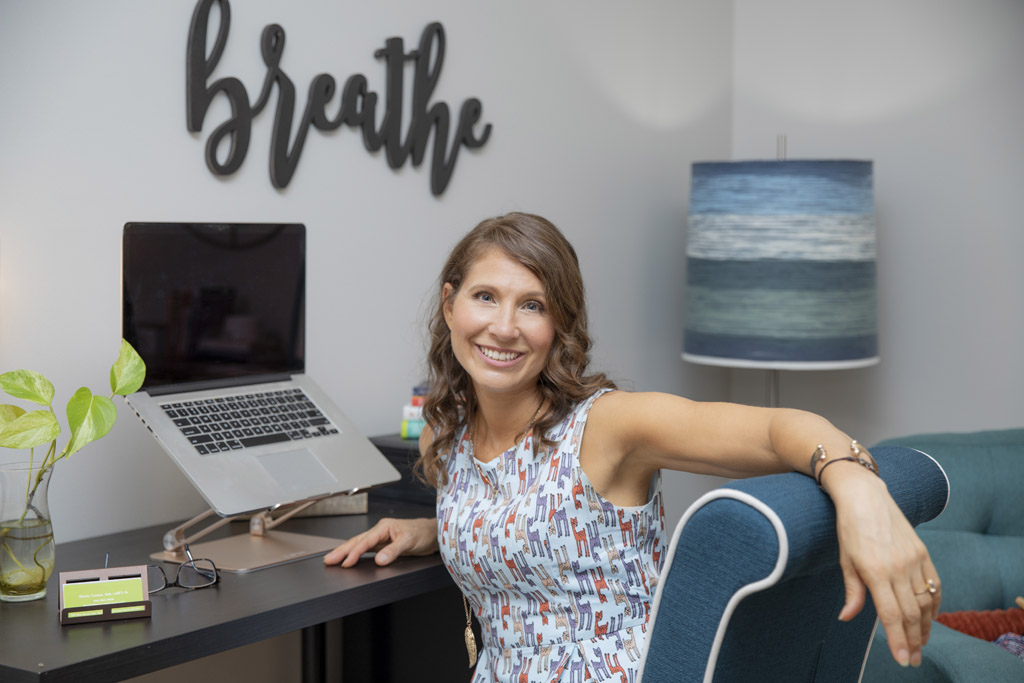I walked slowly into the room. It was cozy and somewhat dark, giving off a gentlemen’s den in a lodge vibe. There was a cognac-colored sofa to the right with a large coffee table and a well-worn club chair. Against one wall was a sofa table with an impressive number of books stacked high in no particular order or arrangement. At the far end of the room was a wall of windows with a desk looking out at the street.
As the door shut behind me, I made my way to the sofa, tentative about what I’d signed up for. Would he notice me turning around mid-stride and walking back to the lobby?
At 18, I’d just walked into my very first therapy session. The research assistant role I secured at the University of Georgia required me to attend weekly therapy sessions.
My therapist was a tall man with thick, curly blonde hair down to his shoulders. He wore black-rimmed glasses, tan corduroy pants, a concert tee, and Vans sneakers. He was the epitome of relaxation.
He sat and gazed intently at me, not saying a word. He soon realized that silence was my friend. I could sit there all day, in silence, unbothered, taking in the room – the sights, the smells, the way the sofa was sticking to the back of my legs, and noticing how my body temperature rises when I’m nervous.

Sheila Tucker is a licensed marriage and family therapist and founder of Heart Mind & Soul Counseling.
After a few moments, he casually looked down at his clipboard and rattled off an endless supply of questions. Why was I there? What did I hope to get out of therapy?
With each question, I became more nervous and tongue-tied. It felt like I was taking a pop quiz for a class I’d never attended. Even though I didn’t have solid answers to those questions, I was happy he was doing most of the talking. I had no idea what to say or how to start.
It’s way more common than you might think for someone to come to therapy and not know what they will talk about – even if they know why they’re going to therapy. This phenomenon can happen if it’s your first time in therapy or your 100th. It still happens to me.
Opening up to someone, especially someone you don’t know, and sharing your secrets and concerns is no small feat. Truth be told, it’s strange and odd, but it’s also freeing.
Generally speaking, first therapy appointments are structured differently depending on your therapist. Your therapist might ask you a list of questions or have you complete assessments to better understand you and the concern that brings you to therapy.
Your therapist might lead with a few questions, but otherwise, you do most of the talking. Then, other therapists will wait for you to talk first.
Unsure of what to talk about in therapy? Here are a few suggestions from me, a therapist.
• Your goals. What do you hope to accomplish during your time in therapy? How do you want to feel or experience life? Goals provide the destination you and your therapist will work towards during each session.
• Your current challenges and stressors, or where you feel stuck. What have you tried to change or improve on your own but isn’t working? What’s getting in your way? Also, what are you doing that works?
• Your patterns. Are you noticing that specific experiences or interactions keep occurring in your life? Talk about those.
• Your relationships, personal history, and background. The ones that frustrate you. The ones that build you up. The ones you miss. The ones you want to set boundaries with. And especially the relationship with yourself. Your relationships help your therapist learn more about what makes you who you are. Meanwhile, your past experiences, including childhood and previous relationships, can influence your current behavior and feelings.
• Your thoughts. What do you think about? Do you overthink or think a lot? Learning about your thoughts can help you to decipher the stories you tell yourself about your experiences. Then, you can explore which are helpful and which aren’t.
• Your feelings. Have you been feeling anxious? Frustrated? Sad? Jealous? Resentful? Unusually happy? There are no wrong answers. Each of your feelings has a story to tell. Your therapist wants to know about all of it.
• Your coping strategies. Talk about any coping strategies you’ve tried and how effective they have been or haven’t been. Your therapist can help you develop new techniques or refine existing ones to manage your emotions and challenges better.
• Your achievements. Your therapist wants to celebrate your successes, no matter how small, and acknowledge the steps you’ve taken toward your goals.
Now that you know where to start, how do you make the most of your therapy time? I have a few ideas.
• Practice your new skills: Therapy isn’t just about talking; it’s also about action. Work with your therapist to practice and implement new skills and strategies in your daily life – not just in the therapy room.
• Question and reflect: Don’t be afraid to question your thoughts, beliefs, or behaviors. Self-reflection is crucial to therapy and can lead to deeper insights and changes. Also, don’t be afraid to question your therapist. Your therapist might make inferences. When they are wrong, let the therapist know. My clients often hear me say, “I’m making up the story that …” followed by, “Please tell me if that resonates or not.”
• Practice self-care: Therapy can be emotionally taxing. Between sessions, practice self-care to maintain your well-being and stay engaged in the therapeutic process. Self-care isn’t one-size-fits-all. It can look like taking a lunch break instead of eating at your desk, saying no to the things you don’t want to do, or drinking more water throughout your day.
Therapy is a partnership between you and your therapist. Actively contributing to the process, in and out of the therapy room, is key to making meaningful progress.
After my first session, I felt like a novice in this unfamiliar world. However, the session slowly became less about finding the right words and more about simply being present.
As I looked around the room, taking in the eclectic mix of books and the soft light filtering through the windows, I realized that this experience was not about having all the answers but exploring the questions that mattered most. I wish the same for you.


